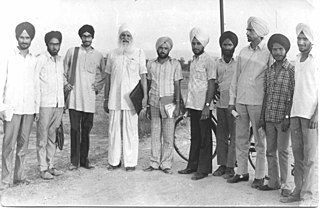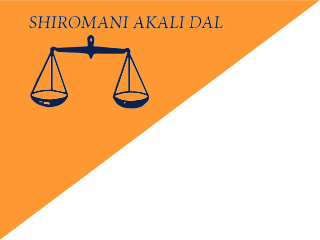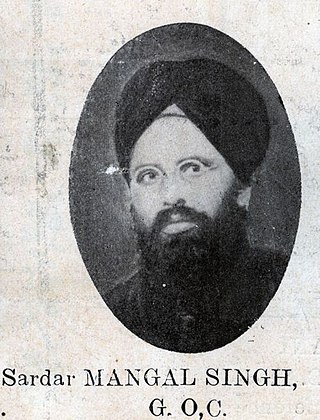The following outline is provides an overview of Sikhism,or Sikhi.

Panth Rattan Shiri Gurcharan Singh Tohra was a president of Shiromani Gurdwara Parbandhak Committee (SGPC),a Sikh body in charge of controlling Gurdwara. He died of a heart attack in New Delhi on 1 April 2004 at the age of 79. He remained the head of the SGPC for a record 27 years,and was one of the most influential and controversial Sikh leaders of the 20th century.

The Punjabi Suba movement was a long-drawn political agitation,launched by Punjabi speaking people demanding the creation of autonomous Punjabi Suba,or Punjabi-speaking state,in the post-independence Indian state of East Punjab. The movement is defined as the forerunner of Khalistan movement.

The Shiromani Gurdwara Parbandhak Committee is an organization in India responsible for the management of Gurdwaras,Sikh places of worship in states of Punjab and Himachal Pradesh and the union territory of Chandigarh. SGPC also administers Darbar Sahib in Amritsar.

Dal Khalsa is an extremist Sikh organisation,based in the city of Amritsar. The outfit was formed in 1978 by Gajinder Singh,the hijacker of Indian Airlines Flight 423. It came to prominence during Insurgency in Punjab,India along with Jarnail Singh Bhindranwale in 1981. Members of the Dal Khalsa have also been accused of the assassination of Lala Jagat Narain. The primary aim of Dal Khalsa is to form a religion-based Sikh nation called Khalistan.
Simranjit Singh Mann is a former Indian Police Service officer and a Member of the Parliament in the Lok Sabha,the lower house of the Parliament of India,representing the constituency of Sangrur since 2022. He is the president of the political party Shiromani Akali Dal (Amritsar). Mann has served three-times as an MP;once from Taran Tarn between 1989 and 1991,and twice from Sangrur between 1999-2004 and since 2022.
The Anandpur Sahib Resolution was a statement with a list of demands made by a Punjabi Sikh political party,the Shiromani Akali Dal,in 1973.

Tara Singh was a Sikh political and religious figure in India in the first half of the 20th century. He was instrumental in organising the Shiromani Gurdwara Prabhandak Committee and guiding the Sikhs during the partition of India,which he strongly opposed.

Majha is a region located in the central parts of the historical Punjab region split between India and Pakistan. It extends north from the right banks of the river Beas,and reaches as far north as the river Jhelum. People of the Majha region are given the demonym "Mājhī" or "Majhail". Most inhabitants of the region speak the Majhi dialect,which is the basis of the standard register of the Punjabi language. The most populous city in the area is Lahore on the Pakistani side,and Amritsar on the Indian side of the border.
Sunder Singh Lyallpuri was a leading Sikh member of the Indian independence movement,a general of the Akali Movement,an educationist,and journalist. Lyallpuri played a key role in the development of the Shiromani Akali Dal,and in the Gurdwara Reform Movement of the early 1920s and also founding member of Central Sikh League. He took part in several roles in the establishment and growth of Indians independence.

The Chief Khalsa Diwan is a 117-year-old Sikh organisation,which is the central Organization of various Singh Sabhas spread across Punjab,India. Unlike the Shiromani Gurudwara Prabandhak Committee,the Diwan is an apolitical body and only concerns itself with religious,educational and cultural issues.

Sardar Hukam Singh was an Indian politician and the third Speaker of the Lok Sabha and second Deputy Speaker of the Lok Sabha from 1962 to 1967. He was also governor of Rajasthan from 1967 to 1972.

Teja Singh Akarpuri was an Indian and Sikh politician who served as the 11th Jathedar of Akal Takht from 1921 to 1923 and 1926 to 1930. He was the First MP from Gurdaspur constituency In Lok Sabha from 1952 to 1957 and was succeeded by Diwan Chand Sharma.

Amrik Singh was the President of the All India Sikh Students Federation. He was killed in the Indian Army's operation on the Golden Temple on June 6,1984.

Fateh Singh was an Indian Sikh religious and political leader,and a key figure in the Punjabi Suba movement. He was revered as Sant Fateh Singh among his followers.

Sohan Singh Josh (1898–1982) was an Indian communist activist and freedom fighter.

The Shiromani Akali Dal (SAD) is a centre-right Sikh-centric state political party in Punjab,India. The party is the second-oldest in India,after Congress,being founded in 1920. Although there are many parties with the description Akali Dal,the party that is recognized as "Shiromani Akali Dal" by the Election Commission of India is the one led by Sukhbir Singh Badal. The party has a moderate Punjabi agenda. On 26 September 2020,they left the NDA over the farm bills.
The Jathedar of the Akal Takht is the head of the Akal Takht and head of the Sikhs worldwide. The jathedar has the de facto power as the supreme spokesperson of the Khalsa to summon,trial and sentence any person who identifies as a Sikh from the Akal Takht.

Bawa Harkrishan Singh was a politician from Punjab and freedom fighter.

Mangal Singh was a Punjabi politician and legislator,member of Central Legislative Assembly and also served as President of SGPC.















